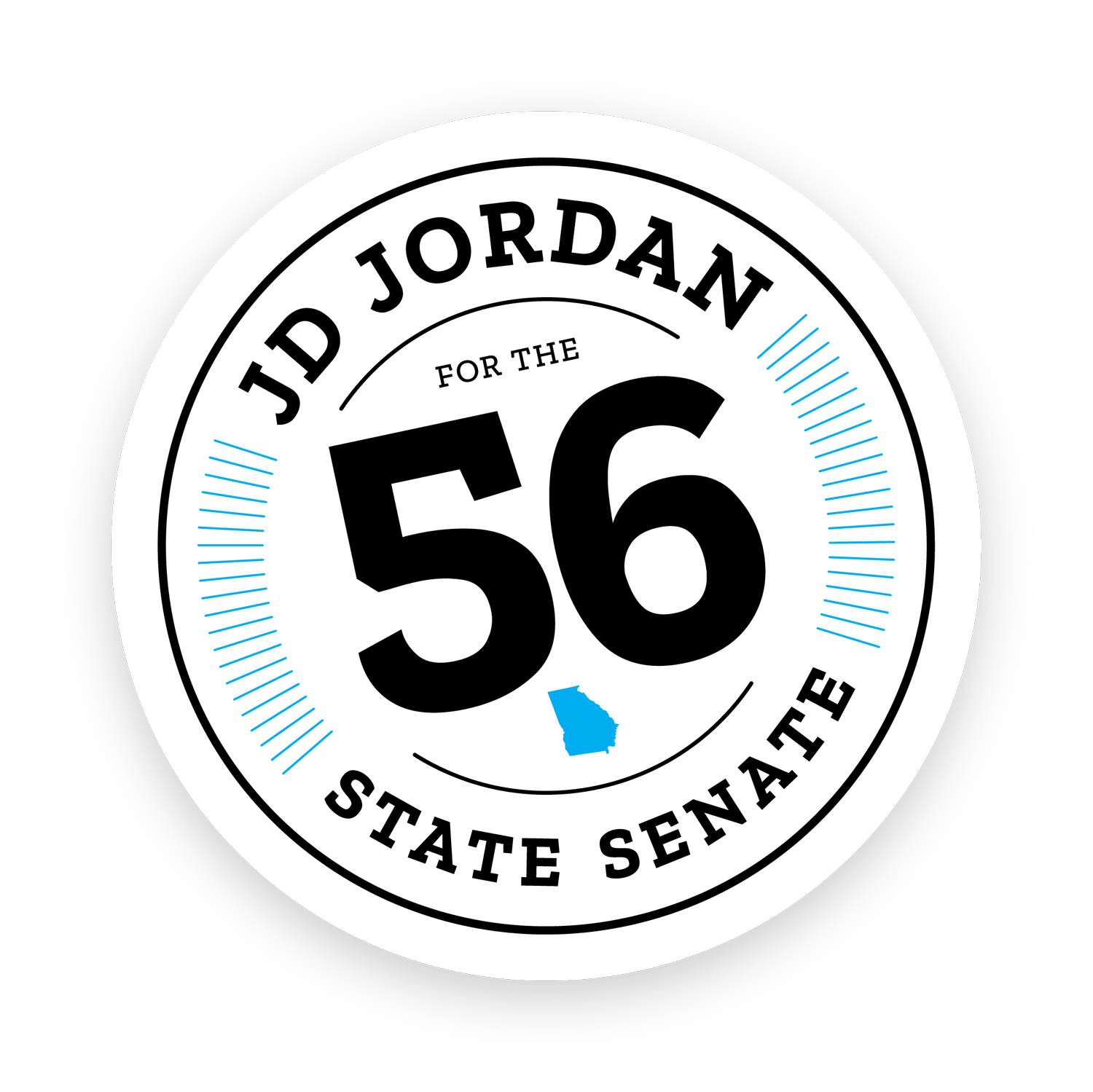Annotated responses about Medicaid expansion.
Challenger JD Jordan (left) and incumbent State Senator John Albers (left) exchanging responses about Medicaid expansion at the recent candidate forum. Photos and videos shot and shared by a Cherokee resident in audience, stabilized and annotated by JD Jordan.
On April 25, the Farm Bureau & the Cherokee County Chamber of Commerce hosted a candidate forum at Canton’s historic courthouse. Incumbents and challengers from a variety of races had a chance to introduce themselves to voters and to debate a variety of audience-suggested topics.
Fortunately for the 56, both our incumbent, John Albers, and I were in attendance. And doubly so that someone in the audience captured the full exchange on their phone!
Over the course of the next two weeks, I’ll share the exchanges from this forum, covering:
In addition to simply sharing these videos, I’ve spent time fact-checking each of our statements and unscripted responses. I’ve performed this critique for two reasons:
Honesty and transparency are cornerstones of a healthy constituent experience and critical to establishing and maintaining trust between members of the public and their elected officials (candidates, too!)
To show I’m open to being fact checked, interested in feedback where I might be further informed, and open to the conversations such critiques may inspire.
If you see an errors in my critique or if you know of a data point I haven’t found, please reach out at me at jdjordan@forthe56.com and I’ll do my best to follow-up and—if necessary—make and note any corrections.
Annotated videos
On Medicaid expansion in Georgia.
Each candidate was given 1:30 to answer an audience question asking if they supported Medicaid expansion in Georgia. Responses were made in alternative order, with JD Jordan answering first and John Albers answering second.
Annotated transcript
JD Jordan: On Medicaid expansion.
I do support Medicaid expansion in Georgia.
I think the governor's attempt at a solution was a good experiment. I don't believe that it has done it. We have about 3,500 people that have been brought on the roles under Governor Kemp's plan. We unfortunately also have about 90% of the costs of that plan not going to healthcare outcomes. They're going to administrative and internal expenses.
True.
Gov Kemp's “Pathways to Coverage” partial Medicaid expansion has only brought in 3,500 people since its launch last July and, of its $26 million in state costs, over 90% went to administration and consultants (and grift, I’d wager) instead of patient outcomes (KFF).
I think it's worthwhile to give Medicare a try. It has been tried in 40 other states.
True.
Georgia is one of only ten states that haven’t fully expanded Medicaid under the Affordable Care Act (KFF). And I had a slip of the tongue, saying Medicare instead of Medicaid. A pneumonic to help remember the difference is: we CARE for the elderly and we aid our NEIGHBORS.
There is a very direct ROI that has been proven in some of these states and it is the base of the economy. If we are not healthy, if we do not have access to healthcare, then we simply cannot work and generate these sorts of futures for ourselves and our children that we're really eager to do so.
True.
ROI = Return on Investment. A substantial body of research has investigated the effects of the Affordable Care Act (ACA) Medicaid expansion. While individual states have to cover 10% of the cost of expanding Medicaid, the federal government covers the remaining 90%, providing an infusion of federal funds to expansion states. The federal government also has $1.2 billion set aside to help states offset setup costs. By financing coverage for low-income people who are likely to otherwise be uninsured, Medicaid expansion provides potential economic benefits to the health care providers who provide care to that population (Georgetown University).
Annotated transcript
John Albers: On Medicaid expansion.
I do not support expanding Medicaid.
It is a failing program and it’s failed in most areas of our state and the current population.
False.
Since Medicaid hasn’t been expanded in Georgia, this statement is a hypothesis at best. Meanwhile, the state’s refusal to expand Medicaid under the Affordable Care Act left 13% of the state's population uninsured, contributing to significant healthcare access issues—never minding the billions in federal dollars left on the table! The lack of Medicaid expansion also resulted in physician burnout and fewer medical trainees choosing to stay in Georgia and the limited access to insurance and increased workload have made Georgia less attractive for medical professionals, exacerbating the healthcare crisis (AJC).
Most all physicians and other medical providers do not take additional Medicaid patients.
Misleading.
He’s correct that many physicians don’t accept new Medicaid patients but John Albers is wrong to say “most”. In the US, nearly all physicians accept new patients with private insurance, but only about 75% accept new patients with Medicaid (SHADAC).
And looking at why Georgia is successful is we do things that fit our state better. That is why Governor Kemp and the legislature has worked together in the Pathways program
True.
The Georgia Pathways program is unique to Georgia. Unlike the traditional Medicaid expansion under the Affordable Care Act, Pathways requires beneficiaries to work, volunteer, or participate in job training for at least 80 hours per month to qualify for Medicaid coverage (New York Times). It’s also unique for its radical inefficiency, with 90% of its $26 million in state costs going to administration and consultants instead of patient outcomes (KFF).
and also requiring people to actually work who are able-bodied to do that.
There's more to it.
While some proponents argue that Pathways encourages employment and community involvement, critics note it creates barriers for vulnerable populations who may struggle to meet the work requirements. Many eligible individuals may lose coverage due to the difficulty in meeting or proving the required hours, undermining the program's effectiveness in expanding healthcare access (New York Times).
There's a difference between giving someone a hand up and a handout and we want to make sure we're giving people a handout that need it, but we want to make sure we're giving a hand up to all those that can come to the table.
Word salad.
Not really sure which hand is doing what, here…
And working together for healthcare outcomes is much more important than working on health insurance.
Unless you don’t have access to outcomes.
Outcomes are critical, yes, but only if you have access to healthcare in the first place. 1.4 million Georgians do not have health insurance and Georgia’s uninsured rate of 13.7 percent is third highest in the country. In rural Georgia, matters are more dire, with an uninsured rate that could climb to more than 25% by 2026 (AJC). Georgia ranks worst in the country for healthcare (Forbes) and our maternal mortality rate is among the worst in the nation (Emory University).
And by doing that we have worked to stabilize our hospitals. We've worked very closely with a thing called the Certificate of Need laws.
True.
This past legislative session, the State Senate and House ping ponged a Certificate of Need bill making it easier to open hospitals in rural counties and outpatient birthing centers without permits (AP).
And we've worked very closely right here with Cherokee Northside Hospital, which is very close and personal in my family because four years ago they literally saved my son's life when he was the brink of death.
True.
John Albers frequently speaks about donating his kidney to his son, a wonderful healthcare outcome for their family that began after a scary night at the Northside Hospital Cherokee ICU (Appen Media).
And I'll be forever indebted to the wonderful folks who are doctors, nurses, and providers at our very own hospital right here in Cherokee County.
JD JORDAN FOR GEORGIA STATE SENATE DISTRICT 56
For anyone in East Cobb, Roswell, or Woodstock alarmed by the state’s escalating attacks on our bodies, our families, our doctors’ offices, our classrooms and libraries, even our polling places, I’m running for state senate district 56 to fight for our freedoms and to deliver a better future for everyone in Georgia.
And unlike my opponent who’s spent 14 years rolling back our freedoms, failing to safeguard our kids, and gerrymandered his district to stay in office, I promise to bring everyone in the 56—regardless of ideology—the best possible constituent experience so you feel heard, valued, and supported. As we all deserve to be.
I’m running for the 56. Let’s make a better Georgia for all of us.
—
FOR MORE INFORMATION, CONTACT
Jordan For Georgia, LLC
10800 Alpharetta Hwy Ste 208 #629
Roswell, GA 30076-1467
jdjordan@forthe56.com
706.804.0456

